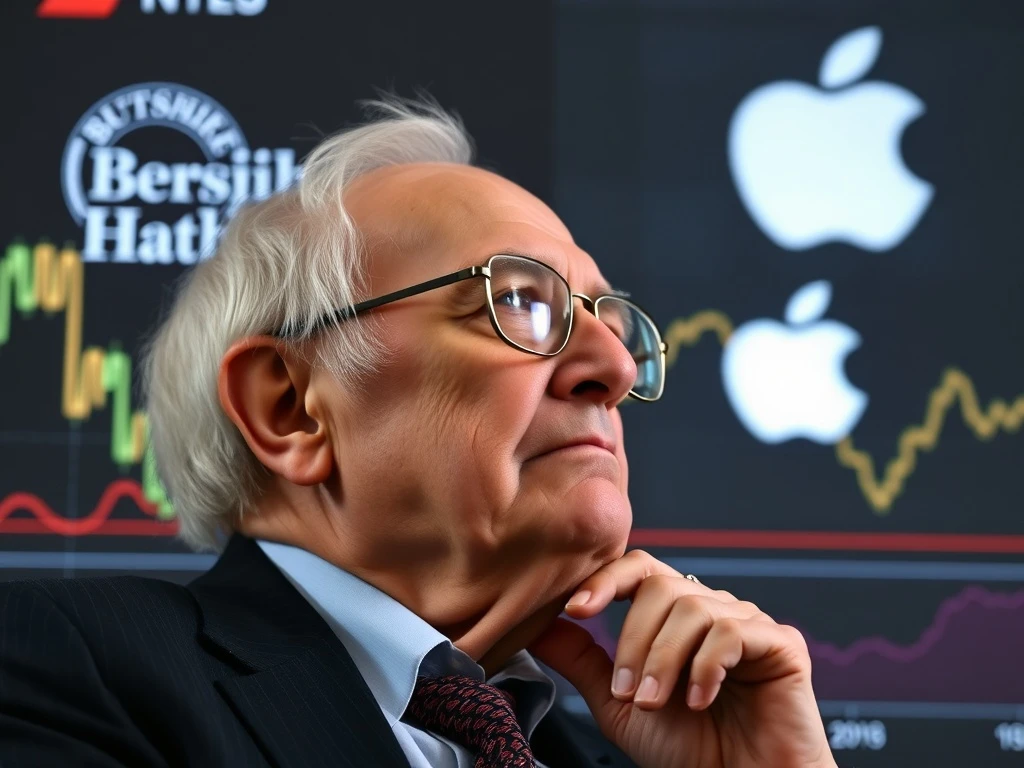Investors worldwide closely watch the moves of legendary investor Warren Buffett. His firm, Berkshire Hathaway, recently made headlines. They purchased a ‘battered stock’ while simultaneously selling more Apple shares. This decision sparks considerable interest. Many wonder about the underlying strategy. What do these Warren Buffett stock adjustments signal for the market? This article explores these pivotal investment choices.
Warren Buffett Stock: Unpacking the “Battered Stock” Acquisition
Berkshire Hathaway’s recent acquisition of a ‘battered stock’ represents a classic Warren Buffett maneuver. Historically, Buffett seeks value in overlooked or temporarily struggling companies. He often buys when others are fearful. This strategy allows him to acquire quality assets at discounted prices. The identity of this specific company remains undisclosed in the initial reports. However, the term ‘battered’ suggests it faces significant headwinds. It might be an industry undergoing a cyclical downturn. Alternatively, it could be a company facing temporary operational challenges. Furthermore, Buffett’s investment signals his long-term confidence. He believes in the company’s intrinsic value. He expects its eventual recovery and growth. This move aligns perfectly with his renowned value investing principles. It emphasizes patience and a deep understanding of business fundamentals. Investors often find inspiration in such contrarian plays. They watch closely for hints about his next target.
The Strategic Reduction in Apple Holdings
In contrast to the new purchase, Berkshire Hathaway also reduced its stake in Apple Inc. Apple has been a highly successful investment for Berkshire. It grew into one of the firm’s largest holdings. This sale, therefore, prompts questions. Why would Buffett trim a winning position? Several factors could influence this decision. Firstly, it might represent simple profit-taking. After significant gains, selling some shares can lock in profits. Secondly, it could be a portfolio rebalancing effort. Berkshire aims to maintain diversification across its vast holdings. Reducing a highly concentrated position can manage risk. Furthermore, regulatory scrutiny sometimes plays a role. Large holdings in major tech companies can attract attention. Lastly, Buffett often emphasizes managing concentration risk. Even a great company can become too large a percentage of the portfolio. This ensures no single stock dominates the entire investment landscape. The sale does not necessarily indicate a negative view on Apple’s future. Instead, it often reflects prudent portfolio management by the Warren Buffett stock team.
Warren Buffett Stock Philosophy in Action
Warren Buffett’s investment philosophy is legendary. He prioritizes long-term value creation. His approach involves several key tenets:
- Value Investing: Buying companies below their intrinsic worth.
- Circle of Competence: Investing only in businesses he fully understands.
- Long-Term Horizon: Holding investments for many years, sometimes decades.
- Strong Management: Preferring companies with excellent leadership.
- Economic Moats: Seeking businesses with sustainable competitive advantages.
These principles guide every Warren Buffett stock decision. The recent moves illustrate this philosophy. Buying a ‘battered stock’ exemplifies value investing. Reducing Apple’s stake demonstrates disciplined portfolio management. It shows an adherence to diversification and risk control. Buffett consistently teaches investors the importance of patience. He advocates for a deep understanding of underlying businesses. His actions provide a masterclass in these core tenets.
Market Signals and Investor Implications
Warren Buffett’s investment actions send powerful signals. His moves are closely watched globally. When Berkshire Hathaway buys a struggling asset, it often suggests a bottom is near. Other investors might then consider similar opportunities. Conversely, reducing a successful position like Apple can prompt reflection. It encourages investors to reassess their own holdings. However, individual investors should not blindly follow Buffett. His scale and resources are unique. Furthermore, his investment horizon is typically much longer. These Warren Buffett stock adjustments offer valuable insights. They highlight potential areas of value. They also show how even the most successful investors manage risk. Investors should use these signals as a starting point. They must conduct their own thorough research. Ultimately, aligning with one’s own financial goals remains paramount.
Historical Precedent for Warren Buffett Stock Moves
Historically, Warren Buffett has often made contrarian moves. He famously bought Coca-Cola during the 1987 market crash. He also invested heavily in American Express during the ‘Salad Oil Scandal’ in the 1960s. These bold decisions paid off handsomely. They underscore his belief in buying when others panic. His recent purchase of a ‘battered stock’ echoes these past actions. It suggests he sees deep value where others see only trouble. Similarly, his portfolio adjustments are not new. Berkshire Hathaway frequently rebalances its holdings. They trim positions that have grown too large. They also sell shares when they believe the valuation is stretched. These disciplined adjustments help maintain a healthy portfolio structure. Thus, the current Warren Buffett stock strategy fits a long-standing pattern. It reflects a consistent and proven investment methodology.
Analyzing the “Why” Behind These Decisions
Understanding the rationale behind Buffett’s choices is crucial. The purchase of a ‘battered stock’ likely stems from a fundamental belief. He probably sees strong underlying business fundamentals. The market might be overreacting to temporary setbacks. This creates a buying opportunity for long-term holders. Perhaps the company has a strong brand. It might possess a dominant market position. Its management team could be exceptional. Conversely, the Apple sale might be less about Apple itself. It could be more about overall portfolio concentration. Apple’s tremendous growth made it a significant portion of Berkshire’s portfolio. Reducing this exposure enhances diversification. It frees up capital for new opportunities. This proactive management ensures capital remains productive. It prevents over-reliance on any single asset. Therefore, both moves reflect a calculated approach. They are not impulsive decisions. They stem from deep analysis and strategic foresight in Warren Buffett stock management.
Future Outlook and Investor Takeaways
These recent Warren Buffett stock transactions provide valuable lessons. They reinforce the importance of a long-term perspective. They also highlight the courage to act contrarian. Investors should focus on intrinsic value. They should also manage their portfolio risks effectively. Berkshire Hathaway’s moves indicate confidence in certain undervalued sectors. They also suggest a disciplined approach to managing successful positions.
Key takeaways for investors include:
- Patience is a Virtue: Allow investments time to mature.
- Value Over Hype: Focus on fundamentals, not fleeting trends.
- Risk Management: Diversify and rebalance portfolios.
- Independent Research: Do not just follow others; understand your investments.
Ultimately, Warren Buffett’s enduring success stems from these principles. His latest moves serve as another practical demonstration. They offer insights into navigating complex market conditions. This continuous learning from the Oracle of Omaha remains invaluable for all investors.
Frequently Asked Questions (FAQs)
1. Why did Warren Buffett buy a ‘battered stock’?
Warren Buffett typically buys ‘battered stocks’ when he believes the market has undervalued a company. He looks for strong underlying businesses facing temporary challenges, aiming to acquire them at a discount for long-term growth.
2. What does ‘battered stock’ mean in this context?
A ‘battered stock’ refers to a company whose share price has fallen significantly, often due to negative news, industry downturns, or temporary operational issues. Buffett sees these dips as opportunities to buy quality assets cheaply.
3. Why did Berkshire Hathaway sell more Apple shares?
Berkshire Hathaway likely sold Apple shares for several reasons, including profit-taking after substantial gains, rebalancing its portfolio to manage concentration risk, or freeing up capital for new investment opportunities. It doesn’t necessarily indicate a negative view on Apple’s future.
4. How do Warren Buffett’s recent stock moves align with his investment philosophy?
These moves align well with Buffett’s philosophy of value investing and disciplined portfolio management. Buying a ‘battered stock’ is classic value investing, while trimming a large, successful position like Apple demonstrates prudent risk management and diversification.
5. Should individual investors copy Warren Buffett’s stock trades?
Individual investors should not blindly copy Buffett’s trades. His scale, resources, and investment horizon are unique. Instead, investors should learn from his principles (value investing, long-term focus, risk management) and apply them to their own research and financial goals.
6. What signals do these Warren Buffett stock actions send to the market?
These actions signal that Buffett sees value in certain undervalued sectors or companies. They also highlight the importance of disciplined portfolio management, even with highly successful holdings. His moves often encourage other investors to reassess their strategies.








